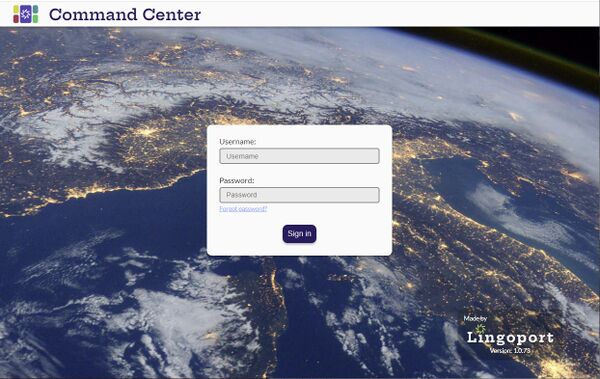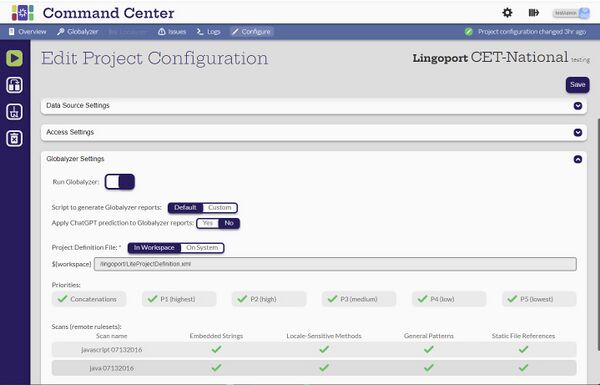Difference between revisions of "About Command Center"
(→Roles) |
|||
| Line 39: | Line 39: | ||
== Globalyzer Introduction == |
== Globalyzer Introduction == |
||
(short, with links to Gz) |
(short, with links to Gz) |
||
| + | [[File:GlobalyzerConfiguration.jpg|600px|center]] |
||
| + | |||
| + | Globalyzer continues to use the the project definition file to determine what rulesets and files to scan. |
||
| + | |||
| + | For more information on Globalyzer scanning see: |
||
| + | |||
== Localyzer Introduction == |
== Localyzer Introduction == |
||
(short, with links to Lz) |
(short, with links to Lz) |
||
Revision as of 23:25, 7 December 2022
Contents
Introduction (one page)
What is Command Center?
Command Center is the next evolution of Lingoport's globalization and internationalization suite of products. In one simple application:
- Users can configure the location of their code and resource files from a variety of data sources including Github, AWS S3, and BitBucket.
- Command Center and Globalyzer can analyze the code for globalization issues.
- Reports are created showing the summary of the issues in the code.
- Code can be viewed in more detail. Suggestions for globalization compliance are given.
- Customers can identify a wide range of resource file types, configure machine translation and translation management systems and automatically submit files for translation.
- Command Center and Localyzer tracks and verifies the resource files through translation and back to the data source.
- Users in various roles (Administrator, Manager, Developer and Translator) can use the Command Center to manage and view the status of projects.
Diagram
(data sources on the left, command center in the center, TMSs/MTs on the right)
Roles
(Admin, Manager, Dev, Translator (API User?) ) Command Center requires usernames and passwords. Each user created in Command Center is assigned a role that defines the operations that can be completed by the user. There are five roles defined:
- Administrator
- Manager
- Developer
- Translator
- API User
The Administrator is responsible for:
- Administering users and teams and assigning them to the users and projects
- Installing and updating licenses
- Managing data credentials and assigning them to managers
- Setting up machine translations and translation management systems
The Manager is responsible for:
- Creating, managing and running projects
- Creating project tags and tokens
The Administrator can view all the projects in the system. The Manager can only see the projects for the teams that they are assigned to. Administrator can create and manage projects, but this is left to managers.. The Developer and Translator can view project status for the projects in their teams, but cannot make any changes to the system.
Globalyzer Introduction
(short, with links to Gz)
Globalyzer continues to use the the project definition file to determine what rulesets and files to scan.
For more information on Globalyzer scanning see:
Localyzer Introduction
(short, with links to Lz) Diagram

